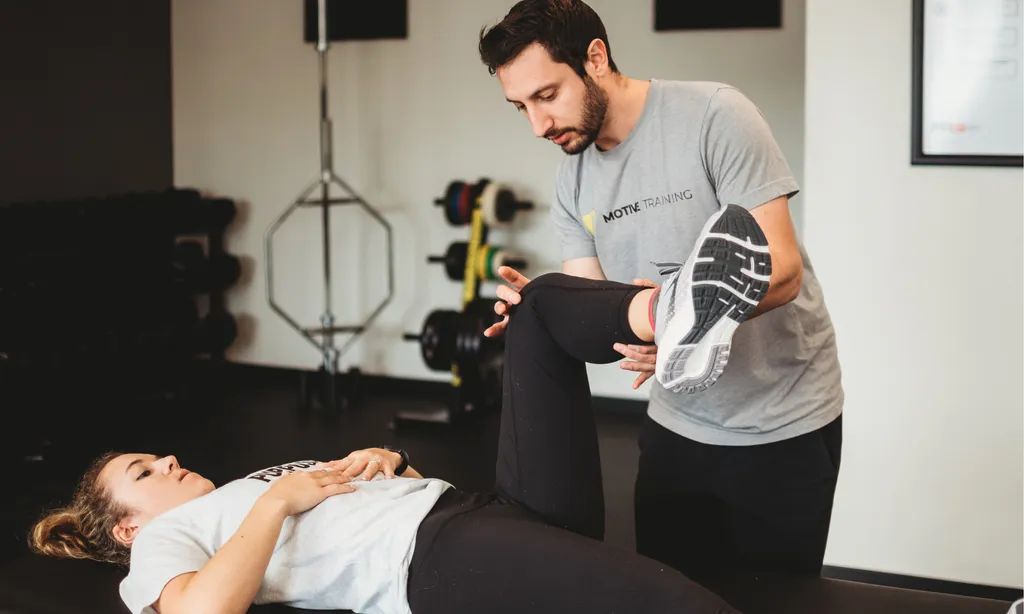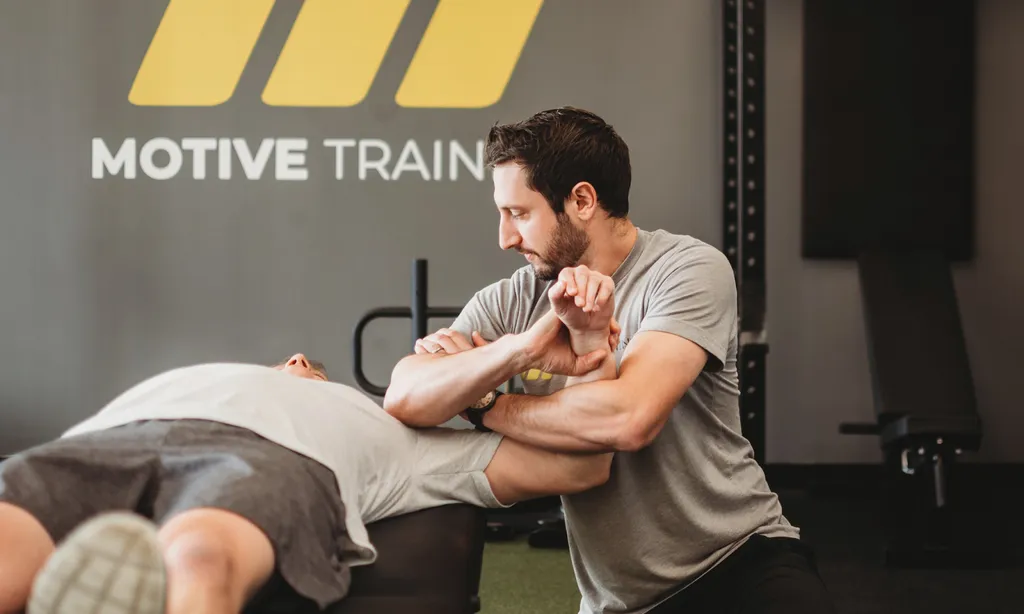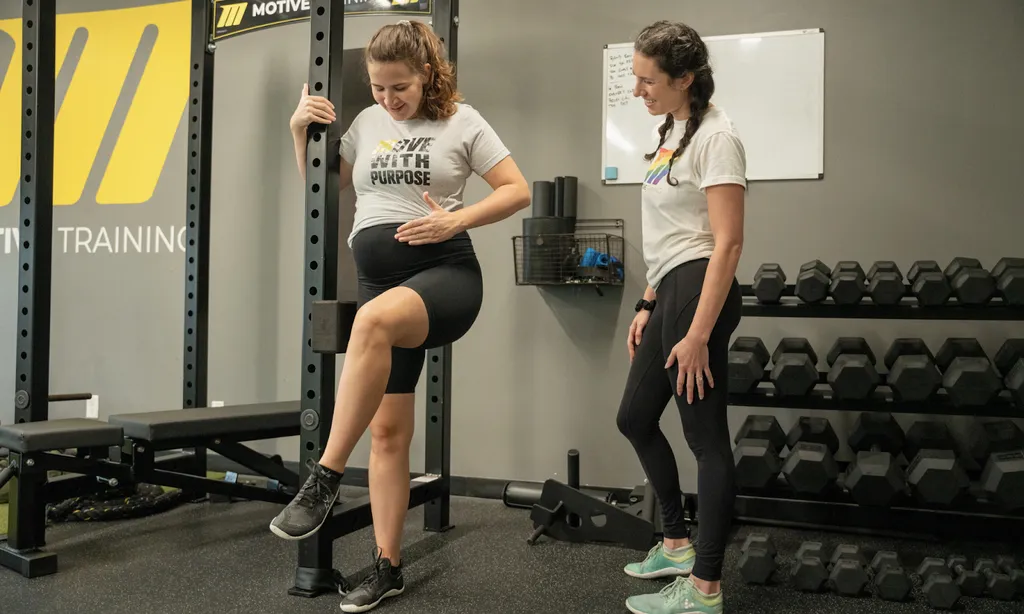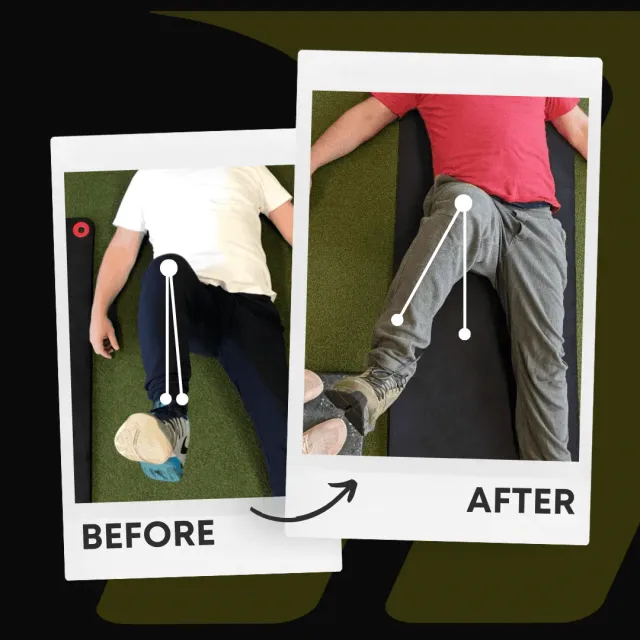The Ultimate Guide To The Functional Range Assessment: Boost Your Mobility & Performance
August 6, 2024 | Functional Range Assessment

The Functional Range Assessment (FRA) is a measurement-based system that offers objective measures of movement capacity for each articulation. It provides valuable insight into an individual’s range of motion and functional abilities. By identifying specific deficits in joint function and movement capability, the FRA removes the guesswork from programming and provides detailed and precise assessments, instilling confidence in the process. This precision and objectivity of the FRA ensures that you can trust the accuracy of your assessments and decisions.
The measurement-based assessment system is designed to:
- Establish movement baselines for each joint.
- Enable objective progress tracking.
- Ensure that every decision is based on scientific data rather than assumptions.
One of the standout features of the FRA is its ability to alleviate chronic pain by identifying and addressing the root causes. The FRA offers deeper insights into client needs, allowing for prioritized management decisions within the Functional Anatomy Systems spectrum.

This comprehensive approach improves mobility and enhances overall well-being by ensuring that each joint functions optimally.
Whether you’re an athlete aiming to enhance performance or someone looking to improve their daily movement potential, the FRA can provide the necessary tools. The FRA supplies:
- Objective measures for each joint.
- Tailored training plans aimed at improving mobility.
- Increasing strength.
- Enhancing performance in various activities.
The journey to a pain-free, mobile lifestyle starts with understanding your body’s movement capacity through the FRA.
Introduction
The Functional Range Assessment is an innovative system designed to:
- Establish a baseline of movement capacity for each joint.
- Quantify both passive and active ranges of motion.
- Paint a clear picture of each joint’s performance.
- Identify any deficits that need addressing.
This comprehensive assessment evaluates the quality of movement patterns and directs appropriate treatments or training exercises tailored to individual needs, ensuring optimal body control.
The beauty of the FRA lies in its objective nature. Eliminating guesswork from the assessment process, the FRA offers precise data useful for:
- developing targeted rehabilitation and training programs.
- making decisions based on accurate and reliable information.
- achieving better treatment outcomes.
- improving overall well-being.
This scientific approach ensures that every decision is based on accurate and reliable information, leading to better treatment outcomes and improved overall well-being. In a world where physical health is paramount, the FRA offers a unique opportunity to better understand your body’s capabilities and limitations. Whether you’re dealing with chronic pain, recovering from an injury, or simply looking to enhance your mobility, the
The FRA provides the insights needed to make informed decisions about your health and fitness journey. Taking the first step towards a healthier, more mobile you is as simple as visiting a qualified practitioner or opting for a virtual assessment from the comfort of your home.
Understanding The Functional Range Assessment
The FRA is an innovative measurement-based system that offers objective assessments of movement capacity for each joint. It is designed to provide accurate and specific information about an individual’s functional range of motion. The FRA evaluates an individual’s movement capacity for each joint, identifying specific deficits in joint function and movement capability. This detailed analysis creates movement baselines for each joint, enabling objective progress tracking and removing any guesswork from the process. The process involves a series of movement tests and measurements, which are then analyzed to provide a comprehensive understanding of the individual’s movement potential.
The FRA system is designed to provide:
- Detailed and precise assessments.
- Elimination of assumptions and biases during evaluation.
- Thorough examination of every aspect of joint function.
- Comprehensive understanding of an individual’s movement potential.
- Targeted approach to addressing client needs within the Functional Anatomy Systems spectrum.
This scientific approach thoroughly examines every aspect of joint function, allowing for a comprehensive understanding of an individual’s movement potential. Based on these insights, FRA prioritizes management decisions and delivers a targeted approach to addressing client needs within the Functional Anatomy Systems spectrum. The Functional Anatomy Systems spectrum is a comprehensive framework that considers all aspects of an individual’s movement potential, from joint function to muscle strength, and FRA is a key tool within this system.
Functional Anatomy Systems is a comprehensive framework that considers all aspects of an individual’s movement potential, from joint function to muscle strength, and the FRA is a key tool within this system.
The FRA offers the following benefits:
- Dispenses with confirmation biases and relies on precise, scientific measurement procedures.
- Delivers a clear and accurate picture of joint function
- Provides crucial information for developing effective training and rehabilitation programs tailored to an individual’s specific needs
- Helps athletes enhance performance and individuals improve their daily mobility.
- Offers the tools and insights needed to achieve your goals
Key Benefits Of The FRA
One of the most significant benefits of Functional Range Assessment (FRA) is its ability to enhance mobility by expanding the range of motion and teaching the central nervous system (CNS) to control these new ranges. The CNS plays a crucial role in controlling joint movement, and the FRA helps train it to manage the expanded ranges of motion. By repeatedly moving the joints through their full range of motion, the FRA helps the CNS adapt and learn to control these new ranges, thereby improving mobility. This improvement in mobility can lead to better performance in various activities, such as squatting and lifting weights, as it builds strength and control in the newly acquired ranges of motion.
The FRA also plays a crucial role in promoting joint health and preventing injuries by optimizing mobility and strength. By integrating the FRA principles into training and rehabilitation routines, individuals can enhance the resilience of their joints and connective tissues, which is vital for maintaining joint longevity. This approach helps prevent injuries and contributes to overall physical performance by improving flexibility and coordination.
Furthermore, the FRA provides objective measures for each joint, which helps alleviate chronic pain by identifying and addressing the root causes. This comprehensive assessment ensures that everyone, not just athletes, can benefit from optimized movement and achieve optimal wellness. For athletes, the FRA can help enhance performance by improving flexibility and coordination. For individuals dealing with chronic pain, the FRA can provide a path to a pain-free and mobile lifestyle, enhancing overall well-being.
The Comprehensive FRA Process
The Functional Range Assessment process is a detailed analysis that checks each joint’s passive range of motion, active range of motion, and rotational capacity. This comprehensive approach is crucial for addressing joint or muscle pain and understanding each joint’s biomechanics and tissue health. The process includes advanced measurement procedures to assess joint passive to active ranges of motion and soft tissue assessment. This assessment influences the central nervous system (CNS) by providing feedback on the joint’s range of motion and strength, which in turn can lead to greater joint mobility and resilience.
The FRA process begins with establishing precise baseline measurements, which provide objective data for personalized training programs and progress tracking. These baseline measurements include evaluating both passive and active ranges of motion and assessing the linear and rotational capacities of joints.
Additionally, the FRA process involves:
- A thorough soft tissue assessment to identify tissue restrictions that influence joint and muscle functionality
- This assessment helps categorize individuals who require movement/rehabilitation training or hands-on soft tissue treatment.
- Advanced measurement procedures, such as Controlled Articular Rotations (CARs), are also employed to provide a detailed understanding of joint movements and tissue restrictions.
Baseline Measurements
The FRA’s baseline measurements offer precise, scientific data, eliminating guesswork from programming. These measurements are critical for creating individualized training programs that address specific deficits and needs. By evaluating both passive and active ranges of motion, the FRA establishes a clear picture of each joint’s movement capacity.
Initial measurement procedures include assessing joints’ linear and rotational capacities, which provide an objective and scientific assessment of a person’s movement capacity. These baseline measurements are essential for tracking progress and ensuring that training plans are tailored to improve joint function and overall mobility.
Soft Tissue Assessment
The FRA process’s soft tissue assessment identifies tissue restrictions affecting joint and muscle functionality. This assessment is crucial for understanding the underlying factors that may be limiting movement and causing pain. By categorizing individuals based on their needs, the FRA can direct appropriate treatment or training to address these issues.
Assessing soft tissue is crucial as it directly impacts the central nervous system, enhancing joint movement and strength. This evaluation is essential for overall rehabilitation and recovery. By assessing both passive and active ranges of motion, along with soft tissue assessment, the FRA provides a comprehensive understanding of joint and muscle health.
Advanced Measurement Procedures

Advanced measurement procedures in the FRA include Controlled Articular Rotations (CARs) for joint assessment and interpretation. These procedures provide a detailed understanding of joint movements and help identify any restrictions or deficits that may be present.
The FRA seminar covers advanced CARs assessment and interpretation and joint passive to active range assessments. These advanced measurement procedures are essential for providing objective measures and understanding tissue restrictions and joint biomechanics.
Tailored Training Plans
Functional Range Assessment (the FRA) at Motive Training helps individuals achieve a pain-free and mobile lifestyle by providing personalized training plans. These plans are based on the FRA’s detailed and precise assessments, eliminating guesswork from programming. The FRA prioritizes management decisions based on deeper insights into client needs, ensuring each training plan is tailored to address individual mobility issues and enhance joint function.
Personalized training plans based on the FRA results often include:
- Targeted strength training.
- Stability and balance exercises.
- Mobility training to improve joint function and reduce pain.
These plans focus on increasing joint range of motion, enhancing joint capsule function, and improving connective tissue quality and muscular control. By addressing specific deficits identified in the FRA and incorporating appropriate training inputs, these tailored training plans help individuals achieve their mobility and performance goals.
Virtual FRA Options
For those who prefer to undergo the assessment process from the comfort of their own home, virtual Functional Range Assessment (FRA) is available. The virtual FRA offers the same level of service as in-person assessments, allowing clients to learn something new about their bodies from home. This option particularly benefits those unable to access in-person services at specific locations.
The virtual assessment comprehensively addresses the nervous system in a way that is similar to the in-person version. Clients can assess every joint for passive and active range of motion and rotational capacity from their own homes. This convenience ensures that everyone can benefit from the comprehensive and personalized insights the FRA provides, regardless of location.
Scientific Foundations Of The FRA
The scientific foundations of Functional Range Assessment (FRA) are rooted in a comprehensive approach that examines all joints to create healthy movement patterns. The FRA offers:
- Precise, scientific measurement procedures
- Aiming to dispel confirmation biases during assessment
- Thorough examination of every aspect of joint function
- Providing accurate and reliable data for developing effective training and rehabilitation programs.
The FRA also integrates the application of neurophysiology and Dynamic Systems Theory to understand and improve movement. This scientific knowledge is combined with Functional Range Conditioning (FRC), which focuses on improving mobility by enhancing strength and control to expand usable ranges of motion. FRC combines flexibility, strength, and neurological control training to improve mobility and joint health through the nervous system.
Controlled Articular Rotations (CARs) form the foundation of FRC, helping in the detailed exploration of joint movements. The FRA seminar builds on the systematic concepts of Functional Range Release (FR®), which focuses on soft tissue assessment and treatment. Participants have described the FRA and FRC as among the most well-researched manual therapy and mobility systems globally.
Real-World Applications
The Functional Range Assessment (FRA) has numerous real-world applications, including rehabilitation, injury recovery, and professional sports training. The FRA can be used for rehabilitation purposes, helping individuals recover from injuries and improve their range of motion. For example, the FRA techniques have been integrated into rehabilitation programs to monitor the progress and recovery of patients following lower extremity fractures.
The FRA has been employed in professional sports to determine the functional limitations in athletes with anterior cruciate ligament (ACL) deficiencies. In professional soccer, the FRA addresses muscular imbalances through tailored strength training programs. Motive Training uses the FRA results to design personalized training plans for individuals, ensuring that each plan addresses specific needs and goals.
Participant Testimonials
Participants who have undergone Functional Range Assessment (FRA) and Functional Range Conditioning (FRC) have shared positive testimonials highlighting the benefits and effectiveness of these tested training methods. Todd Bumgardner mentioned that FRC and FR completely expanded his thought process as a coach and manual therapist. Chris Merritt stated that Dr. Spina’s approach completely changed his perspective on anatomy, mobility, and movement.
Participants have found FRC beneficial for managing conditions like multiple sclerosis, with significant improvements in shoulder mobility and pain management reported after just three weeks. The mental shift towards utilizing pain-free ranges of motion was a crucial realization reported by participants. Daily CARs routines helped participants develop an awareness of their joints and improve shoulder conditions.
The key benefits of FRC include:
- The mentorship aspect, where trainers provide close guidance on joint mobility
- Easy integration into existing workout routines without causing burnout
- Ability to perform FRC exercises even with injuries, emphasizing its inclusivity.
Summary
In summary, The Functional Range Assessment (FRA) offers a comprehensive, scientific approach to understanding and improving joint function and mobility. By providing precise, objective measures for each joint, the FRA removes the guesswork from programming and allows for the creation of personalized training plans that address specific deficits and needs. Whether you’re an athlete aiming to enhance performance or improve daily mobility and alleviate chronic pain, the FRA provides the tools and insights necessary to achieve your goals.
The benefits of the FRA include enhanced mobility, improved joint health, injury prevention, and better overall physical performance. The integration of Functional Range Conditioning (FRC) further supports these goals by combining flexibility, strength, and nervous system training. By embracing the principles of the FRA and FRC, you can embark on a journey towards a pain-free, mobile lifestyle and unlock your full movement potential.
Frequently Asked Questions
What Is The Functional Range Assessment (FRA)?
The Functional Range Assessment (FRA) is a measurement-based assessment system that provides objective measures of movement capacity for each joint, identifying deficits and creating personalized training plans.
How Does The FRA Help In Alleviating Chronic Pain?
The FRA helps alleviate chronic pain by identifying the root causes of pain and addressing specific deficits through targeted training and treatment. This approach provides objective measures for each joint, aiding in effective pain management.
Can I Undergo The FRA From Home?
Yes, you can undergo the FRA from home through virtual options. These provide a comprehensive assessment and personalized training plans tailored to your needs.
What Are The Key Benefits Of The FRA?
The key benefits of the FRA include enhanced mobility, improved joint health, injury prevention, and boosted physical performance. These are achieved through the optimization of movement capacity and strength.
How Is The FRA Different From Other Mobility Assessments?
The FRA differs from other mobility assessments because it offers precise, scientific measurements that remove guesswork and biases, ensuring an objective understanding of joint function and movement capacity.
Written by

Motive Training Staff
We’ll teach you how to move with purpose so you can lead a healthy, strong, and pain-free life. Our headquarters are in Austin, TX, but you can work with us online by signing up for KINSTRETCH Online or digging deep into one of our Motive Mobility Blueprints.




